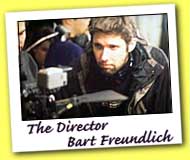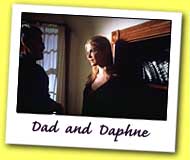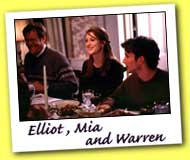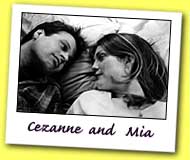

My initial idea was to write a story about the individuals who make up a family. I was trying to make each one of them distinct and independent, but at the same time show how they are all connected to one another, in both good and bad ways.
Definitely thematically, but not in terms of actual events. I'm not from such a big family. I have one brother, and I grew up in Manhattan and we had a country house on Long Island. So it's not exactly my story. But many of the emotions were based on my experience with my family, as well as other families I've known. I divided my conflicting thoughts on relationships and family up amongst each of the children and their mates. So in that way, I think each of the characters is a part of me. It was especially interesting to explore the idea that all of these people can be affected by the same environment and the same person--the father. But they all end up being so totally different: one just closes down; one is extra-sensitive, and needs more approval; and another seems totally unaffected.
I wanted the style and the look of the film to mirror what the film was about--the difference between how people look on the outside, and what's really going on inside. The members of this family are all very attractive, and they all look like everything's okay. But once you look beneath the surface, you see that they all have very deep-seated problems. I felt like it was important not only to choose actors who could look like a family (people who could come from Blythe Danner and Roy Scheider's loins), but who also looked like they should be having great lives. And I hope that the look of the film lulls you into a false sense of security. I mean, how could all this terrible stuff be going on in such a beautiful landscape?
That and the fact that I wanted to get this story out of an urban area. I wanted the feeling that when everyone came back, that they had to make a little bit more effort than other people might to get home--they couldn't just take the crosstown bus. And secondly, I wanted to isolate them, so they couldn't just leave any time they wanted to. And I think that there's a sense, when you're going home to a more rural area, that it holds a lot of memories and nostalgia for you. And it's ironic that in this calmer place, these people's real problems are revealed even more clearly.
There were a couple of lines about that in the original script, but I think for them it's like opening up a huge can of worms. They feel it's a given--this is who their father is. They've grown up with him. And they're scared that if they bring it up, they won't have a solution for it, that it will be more than they can handle. They've been taught denial in their family. That that's the way to do things. You move away, you don't visit too much and avoid dealing with your problems. But as they've all discovered, problems have been backing up on them.
She says in the movie she doesn't know why. But I think that as your kids grow up and leave the house, you're left in a new kind of relationship with your husband, similar in some ways to what you had before your kids were born. And I think she sees him in a totally different way. I truly believe that Hal loves Lena differently than he could ever love anyone else. She's the only person he loves unconditionally. Roy Scheider and I did a lot of talking about his character, how even before the kids were home, he had all these rules: he wouldn't talk before 10:00 a.m., and things like that--he'd just sit at the breakfast table. Even if his wife asked him a question, he was silent. Lena puts up with all his rules, and all his quirks and insecurities. It's much easier for her to do that than the children, because he gives something back to her. He actually communicates with her. And he needs her--she is almost his link to the outside world. And I think that she's a codependent person who's gotten used to being needed in that way. It's not that there's no true love between them, but I think their pathologies are very intertwined. But all of that gets really exacerbated when the kids come home. And now instead of just one person who wants something, there are a lot of different people who want a lot of different things. And how to please everyone is her problem, really, and she understands that she doesn't really have a solution.
Oh, sure. I think there is unintentional irony in that it sounds like "The Silence of the Lambs." But I made it up almost as if Cezanne were creating it as he goes along. In other words, I didn't really flesh out the details of the story--it doesn't really matter exactly what happens in the book. All I knew is that I wanted Cezanne to start from the title and tell a fairly plausible story based on that. What I really wanted the story to be was an avenue of communication for Mia and Cezanne--a sort of screen that he could set up for her to project her emotions onto. He knew that she was someone who wasn't going to open up by talking about those things directly. So he gives her a way to do that by telling her a story that is really sad and emotional, a story about memory and loss, just like "The Myth of Fingerprints." He pushes Mia's buttons in that way, and lets her open up in a safe environment. He lets her come around on her own terms.
Many people who are able to help other people, and can give advice, aren't always the healthiest people themselves. They can see other people's problems very clearly, but can't tackle their own. And Elliot definitely seems to have a problem with intimacy, because he gets in this relationship that he knows isn't going to be successful. And, as a therapist, maybe Elliot wants to try to cure Mia a little too much. Cezanne isn't as explicit about all that. So Mia's able to open up a little bit to him.
Yes--Margaret just isn't scared of any of them. She feels very entitled. It's like going over to a friend's house, and finding that you can have more of a connection with their father than they can, because you don't have all the baggage. She doesn't know the history of the family except through Jake and what you would assume she noticed since she's been there. So she comes without all these expectations of it being a terrible weekend. She thinks, "It'll be really interesting to see where he's come from." But she also won't stand for this awkward silence that's in the family. So she just fills in all the gaps. She is intrigued by the father, who most people are scared of. And he, in some sick way, appreciates the fact that she's not scared of him, because it doesn't make him feel like a scary person.
She was based partly on my brother. My mother always said that my brother came out of the womb fully formed. He just walked out as the person he is today. But there's something subtle in Leigh's behavior that really implicates her as a part of this family, which is that she spends half the movie hitting on Elliot, her sister's boyfriend. Which is funny in the movie, but in reality is totally inappropriate. I mean, this is someone who doesn't have any boundaries, clearly. And, as we've seen, she's a lot like her father in that way. So, as sweet and funny and carefree as she is, she's also actively hitting on her sister's boyfriend during the weekend. And that's really not a healthy thing. But in a way she is the light-hearted one in the family. She missed the worst time because she was younger than the rest when the father unloaded all his bad stuff on the other children. It didn't register with her.
Well, a fingerprint points to the fact that all these people are genetically related and, in a lot of ways, are very similar to one another. But the children in the family have also developed very differently from one another. The question it presents is: how much are their identities tied to where they grew up and to who was around them? And how much of their personalities have they had to create from scratch in order to go on with their lives? That's what fingerprints represent to me--these people's identities: something that on the one hand is genetic, and thus inherited, and yet at the same time is completely unique.
Jake is wracking his brain for some answers during the weekend, because he's wondering if his family has been keeping him from saying "I love you" to Margaret. But obviously, because everyone's family has an aspect of dysfunction, no one would be able to have a successful relationship if that were true. Also, Jake's idea about what "success" is changes throughout the weekend.
Yes. This is about the characters, not the story. If you trust that you've established your characters well enough, I believe you can allow them to do a lot of things that aren't directly explained in the film. A lot of the time in life, people's behavior isn't directly understandable, or explainable. And I didn't want this movie to be about going from point A to B to C. Part of my philosophy in making the film was to be very careful in handling what people did not talk about, and what people did not explain, and what we did not show. That's why the actors play around a lot with the edges of the frame. Occasionally in the foreground of a shot, an actor is in shadow, and there's a bright light behind them. Everything isn't just spot on. We didn't illuminate the exact things that are at the core of every scene. In the original script there was a scene where Hal gets into bed, and says, "I'm trying to love him as much as I can." And Lena says, "Loving your children isn't something you try to do." I removed that scene, even though it was very satisfying in a way, precisely because it summarizes what's going on. For me, it's much more rewarding to watch the dynamics of this family in action, through the chemistry between the actors and through the way the scenes play out next to one another. You actually see that this man is not without any caring, or regret, or love for his children, as opposed to just hearing him say it in a single line. I hope that the movie accumulates emotion, as it goes along. So when you get to the end, you realize, "I actually know who these people are, and what their relationship is to one another, yet I'm not sure that they've ever told me."
No, but I think that it does make a positive statement about how you exist in the context of your family. It shows that you have to learn to leave things behind, even though that can be difficult, and that your feelings for people change over time. But all in all, the film shows that even within a family with very ingrained behavior, there's a lot of potential for new beginnings, maybe separately, maybe together. And there's a lot of potential to do things that you never thought you'd be able to do, and confront things that you never thought you'd be able to confront. It shows that you are, to a certain extent, in control of your own life--that you can change. I do think the film plays the hard line. It doesn't back down and give you a really romantic, gushy view of a family. But it certainly leaves some hope for these kids' lives, even if it is separate from the family as a unit.
That's true, even for Mia, who is alone in her room at the end. She certainly has talked more about her past in those three days than she has in the last three years. And she's also out of a dysfunctional relationship. Whether she's going to be able to move on to a new relationship or not is a different question. But I like where the movie ends. The characters have come to a place with a lot of regret, but also a lot of possibility-- it's a place where you can see that there is a way to get past the regret.
Yes. After one of our screenings, someone asked me, "What happens to them after this?" And I think you do want to know if this family is going to be able to come together more. But I felt that this was a really natural place for me to end the movie. It's more truthful to these characters and their situation because there's just the hint that something might be changing. |

|
|

|
||

|
||

|
||

|
||

|
| Copyright ©1997. All Rights Reserved. | Please mail us with any questions or comments. |